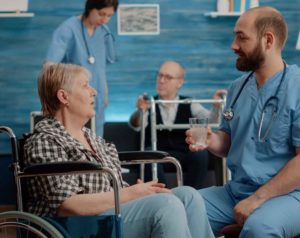Dehydration in Nursing Homes
Abuse and Neglect Attorney
Personal Injury | Pennsylvania & New Jersey
Bedsores · Wrongful Death · Malpractice Lawsuits · Elder Abuse
Dehydration in Nursing Homes
All Pennsylvania and New Jersey nursing homes, including Philadelphia, are required, under state and federal law, to provide their residents sufficient liquids to prevent dehydration. Unfortunately, these laws are not always abided by and, too often, Pennsylvania and New Jersey nursing home residents are denied this basic necessity. As a result, they needlessly suffer dehydration for which the nursing home can be held accountable.
Dehydration Is Nursing Home Neglect
While otherwise preventable, when dehydration occurs, it is a form of nursing home neglect. Dehydration is the direct result of a significant deprivation of liquid intake. If ignored or not properly attended to, dehydration can become a very serious threat to a nursing home resident’s medical condition and, in extreme cases, can contribute to a resident’s death.
Especially with the elderly, it is important to maintain proper levels of fluid in the body. A ten (10) percent reduction of fluids in an elderly person can pose a serious risk of harm. A twenty (20) percent reduction of fluids may lead to death.
It does not take much for an elderly nursing home resident to become dehydrated. Relatively short periods of time without water, warm environments, or increases in body temperature can all lead to dehydration. Accordingly, nursing home care providers are responsible for monitoring hydration levels closely. They are charged with the duty of making certain that all nursing home residents are receiving proper fluid intake.
Signs of Dehydration in Nursing Homes
Below are some common signs of dehydration to look out for with your nursing home resident. If your loved one has suffered from any of these symptoms, he or she may be suffering from dehydration. Contact nursing home abuse attorney Brian P. Murphy to get your questions answered. Signs of dehydration commonly include:
- Dry mouth
- Dry skin
- Extreme thirst
- Loss of appetite
- Dry lips
- Darkened urine
- Feeling light-headed
- Chills
- Seizures
- Labored breathing
- Confusion
- Constipation
Why Dehydration Occurs in Nursing Homes
Pennsylvania and New Jersey
Preventing Dehydration
Below are actions nursing home staff members should be taking to prevent dehydration. If these preventative measures are not taken, your loved one may have been subjected to nursing home neglect.
- Continuously provide residents with adequate amounts of fluids.
- Provide supervision of liquid intake during meal and snack times.
- Make sure all liquids are being consumed.
- Educate nursing home staff on hydration methods.
- Monitor and track at-risk residents’ ability to swallow and consume liquids.
- Monitor medications that may increase the likelihood of dehydration.
- Monitor a resident’s mood to ensure depression is not impacting liquid consumption.
- Record the resident’s liquid consumption.
- Provide sufficient number of staff to properly hydrate and monitor residents.
- Continuously attend to residents who need assistance drinking.
- Remain on watch for any signs of dehydration.
- Encourage fluid intake during and in between meal times.
- Notify a physician if a resident appears dehydrated.
- Ensure that residents’ IV fluids are timely replaced.
- Measure, record, and track residents’ water consumption.
Nursing Home Abuse & Neglect
Why You Need an Attorney
If you have reason to believe your loved one has suffered dehydration at his or her New Jersey or Pennsylvania nursing home (including Philadelphia), contact Nursing Home Abuse Attorney Brian P. Murphy who has handled a litany of dehydration cases that resulted from long-term care facility neglect. Pennsylvania and New Jersey laws have a limited amount of time to file a nursing home abuse lawsuit, so it’s best to act before it’s too late.
Brian P. Murphy, Nursing Home Malpractice Attorney

This website is owned by Attorney Brian P. Murphy. Its purpose is to assist you in understanding your rights, especially when it comes to preventing or protecting yourself and/or your loved ones against nursing home abuse, neglect, bedsores, dehydration, and wrongful death. Legal matters are billed on a contingency fee basis.
Nothing on this website is to be construed as attorney advice or otherwise creating an attorney-client relationship. If you may be interested in establishing a relationship with The Law Firm of Brian P. Murphy, PC, please contact us to discuss your options.

